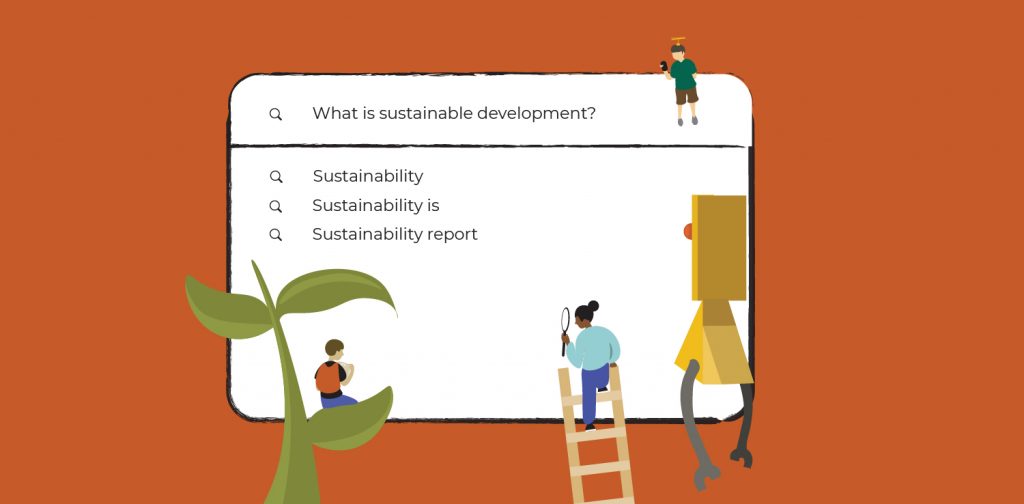Sustainability Isn’t All Environment. Then, What Is It All About?

Illustration by Irhan Prabasukma
What is the first thing that comes to mind when you hear sustainability? If it’s the environment, well, you’re right, but not quite. There’s more to it.
While sustainability did start from environmental concerns, the concept has branched into other aspects of human lives, namely the economy and society. It doesn’t only mean Earth with lush, green trees and a clear blue ocean; it also means everyone gets to receive an education and live safely in their homes with full bellies.
The Basics of Sustainability
In 1987, the United Nations Brundtland Commission defined sustainable development as “development that meets the needs of the present without compromising the ability of future generations to meet their own needs.”
In other words, it acknowledges that the Earth’s resources and diversity will eventually run out, which is a recipe for economic and societal collapse. Therefore, sustainability seeks to build a better life for the current generations and conserve the resources for future generations.
To put it simply, sustainability is multidimensional and intersectional. There are many aspects to sustainability, and the three main ones are:
- Environment – balance for every component of the environment, including biodiversity and natural resources, including seeking a way to consume the planet’s resources responsibly for the sake of future generations.
- Social – equal opportunity to lead a better life for everyone, such as gender equality, child protection, labor rights, and access to healthcare.
- Economic – long-term economic development at no expense of the environmental and social aspects.
These three aspects and more of them are connected; a change in one can affect the others. For example, the past century saw rapid changes in global economic development. However, the growth is also accompanied by climate change, a complex environmental issue that is also about the power and economic gap in the class system.
Ultimately, to truly achieve sustainability, it is crucial to understand and address challenges within the concepts of:
- Justice, equity, and fairness
- Long-term, multi-generational view
- Interconnection between the environment, society, and economy
- Limitation of the world’s ecosystems
Sustainability and Sustainable Development
The concept of sustainability has been trending over the past decades, but do you know of sustainable development? What is the difference?
The difference can be this simple: sustainability is often thought of as the long-term goal, and sustainable development is the many processes and pathways to achieve it, including but not limited to poverty eradication, rural development, sustainable agriculture, capacity development, and more.
Sustainable development is about creating strategies and operations so people can fulfill their needs and prosper without sacrificing nature. These strategies and operations must lessen the burden on the environment while still aiming for economic growth and social improvements.
Developments after developments have been made in the wake of sustainability, including the Sustainable Development Goals by the United Nations.
Sustainable Development Goals

The United Nations’ Sustainable Development Goals (SDGs) were adopted in 2015 to act as a blueprint for moving forward to end poverty while balancing the environmental, economic, and social aspects. This plan has 17 specific Goals, each with its measurement.
Each of these Global Goals affects all three aspects of sustainability. For example, Goal 5 on Gender Equality aims to end all discrimination against women and girls, ensure equal opportunities in life, and empower them to take action on climate change.
The integration of these 17 Goals means that there will be a set of chain reactions when development happens in one part. Improving the water quality in an area (Goal 6) means one step forward to a better, healthier life (Goal 3).
The SDGs work in the spirit of collaboration and with the principle to “leave no one behind”. Governments, businesses, and civil society must work together to achieve the Global Goals while ensuring all parts of society are taken care of, especially the vulnerable ones.
Better Understanding for Better Actions
The misconception that sustainability is all about the environment is very common. Even some industry experts and high level officials in governments still have this preconscious notion about sustainability. Sustainability must exist in food, fashion, city planning, tourism, technology, and everything else.
To commit to taking action, one needs to understand what they’re in for. Understanding where sustainability comes from, what it stands for, and everything surrounding it is the first step in building a prosperous life for all.
Editor: Marlis Afridah

Co-create positive impact for people and the planet.
Amidst today’s increasingly complex global challenges, equipping yourself, team, and communities with interdisciplinary and cross-sectoral insights on sustainability-related issues and sustainable development is no longer optional — it is a strategic necessity to stay ahead and stay relevant.


 Indian Gig Workers Push Back Against 10-Minute Delivery Service Strain
Indian Gig Workers Push Back Against 10-Minute Delivery Service Strain  Call for Governance: Grassroots Initiatives Look to Scale Efforts to Conserve Depleting Groundwater
Call for Governance: Grassroots Initiatives Look to Scale Efforts to Conserve Depleting Groundwater  Integrating Environment, Climate Change, and Sustainability Issues into Education Systems
Integrating Environment, Climate Change, and Sustainability Issues into Education Systems  Finally Enforced: Understanding the UN High Seas Treaty
Finally Enforced: Understanding the UN High Seas Treaty  Risks and Opportunities of Submarine Communication Cables for Sustainable Development
Risks and Opportunities of Submarine Communication Cables for Sustainable Development  Rising Attacks and Violence Against Land and Environmental Defenders
Rising Attacks and Violence Against Land and Environmental Defenders